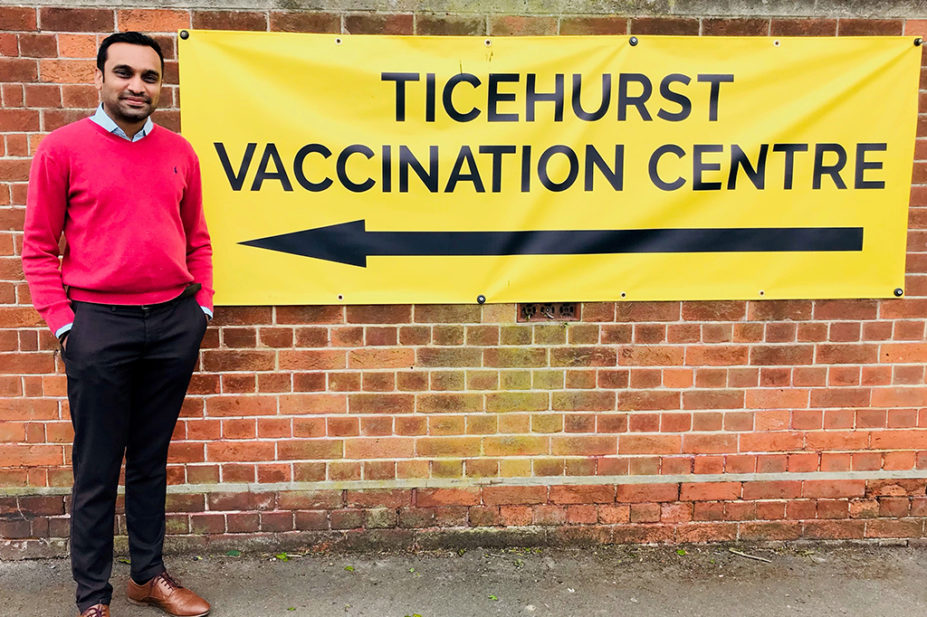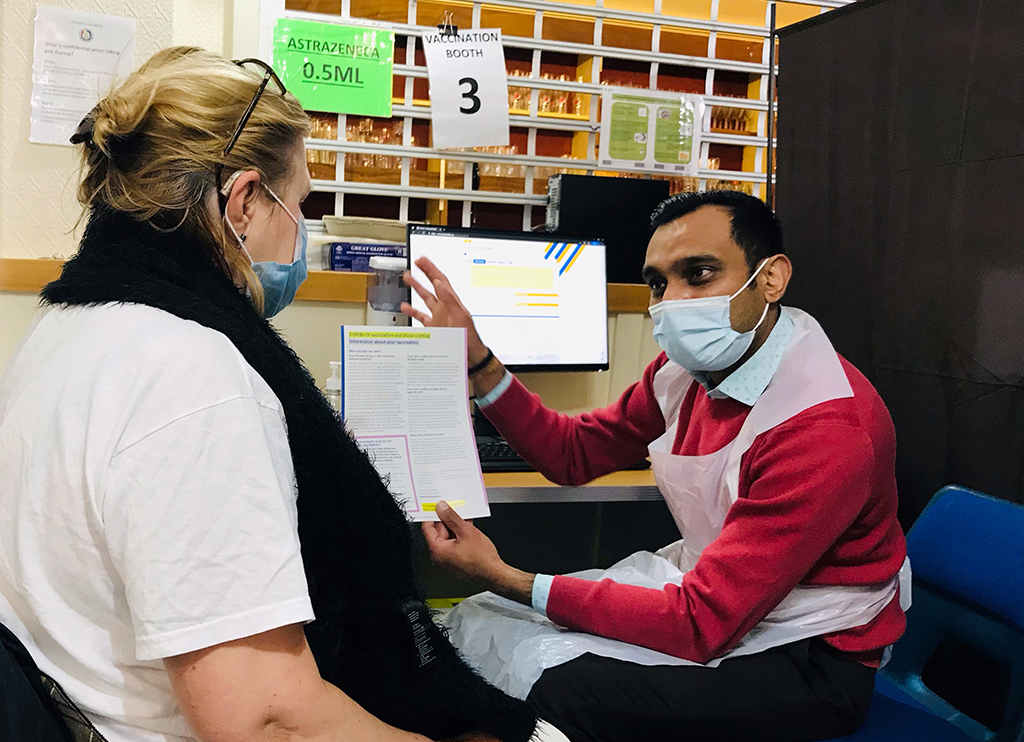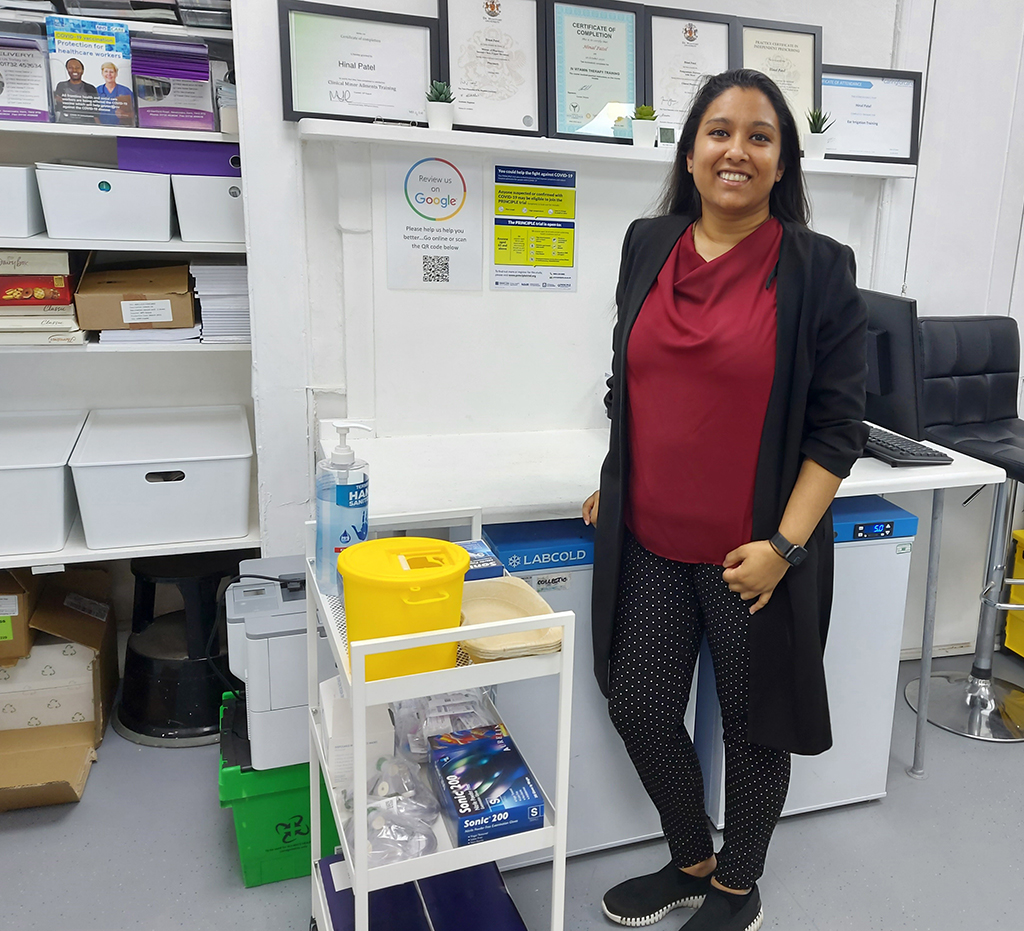
Hardik Desai
Pharmacist Hardik Desai was determined to ensure villagers in Ticehurst, East Sussex — where his pharmacy is situated — could receive COVID-19 vaccinations without having to travel out of the area.
Desai applied to NHS England for a licence to run vaccination clinics from his pharmacy and, when he was told it was too small, sought other premises, eventually hiring the village hall (see Box). Then he recruited vaccinators — mainly nurses and a retired doctor —and worked with a local community group to find a staggering 170 volunteers to help things run smoothly.
Three months later, the team has vaccinated more than 18,500 people — many times the population of the village — and would have done more had consistent vaccine supplies been available. His efforts were even singled out for praise by prime minister Boris Johnson at a COVID-19 press conference.

Hardik Desai
Up and down the country pharmacists have been vaccinating their communities, often making vaccinations much more accessible, especially to those without their own transport.
Box: Space and place
Many pharmacies are not big enough to host vaccine clinics — especially given the need to socially distance — so pharmacies have had to be show their ingenuity in finding suitable venues.
Village halls and sports facilities have been pulled into use, along with churches, mosques and gurdwaras. In some cases, empty shop units are being used.
Day Lewis opened its first site in a cafe in the middle of a livestock market in Oswestry, Shropshire, and has others in rugby club premises. Pharmacy2U — best known for its online prescriptions — set up 16 sites in places as diverse as racecourses and cinemas. By the end of April 2021, it had vaccinated 230,000 people, and could have done more were it not for issues over vaccine supplies, according to superintendent pharmacist Phil Day.
The company had set up sites that could run for 12 hours per day, seven days per week, but a lack of vaccines has meant that many are only running for half that time. The company believes it can run about 50 sites, he added, and has now “cracked the logistics”, allowing it to set up new sites across the country easily.
Some of its sites have been in marquees erected in supermarket car parks, which have raised additional considerations, such as the need for security and heating.
An obvious issue with some of these non-pharmacy sites is that they may be needed for their original use as restrictions subside. Depending on space, this could lead to some pharmacies having to relocate or close their clinics.
But in some cases, the owners have gone out of their way to make sure vaccinations can continue. Day Lewis has been using a rugby club’s premises in Burnham-on-Sea, Somerset. As restrictions have eased and play becomes possible, the club has volunteered to move any home matches to away to enable vaccinations to continue.
Pharmacy2U is planning to move out of its cinema sites because they are needed for showing films. It has, however, located some alternatives, including space at Buckinghamshire New University, and is looking at using empty shops.
Community effort
The village of Grasmere in the Lake District, Cumbria, is idyllic but, with limited public transport, many people from Grasmere and the surrounding hamlets would struggle to reach a major vaccination centre.
However, the village’s pharmacy has stepped into the breach and, since the end of March 2021, has been providing vaccinations at the weekend in the village hall. Pharmacist Zi Voon says uptake has been good. Ironically, some bookings have come from Penrith, a major town 26 miles away, because residents struggled to access services there. In the first three weeks of opening, around 2,000 people had been vaccinated.
It is about the community coming together to do the vaccinations
Zi Voon, pharmacist at Grasmere Pharmacy
“It is about the community coming together to do the vaccinations,” says Voon. “Without the villagers help, it would be quite hard.” Volunteers help to marshall patients and register them, while the vaccinations are done by Voon, other pharmacists and nurses from the local surgery.
In Sevenoaks, Kent, Hinal Patel’s pharmacy has vaccinated more than 12,000 people — the vast majority of them done by Patel, who only has another vaccinator alongside her for a couple of days a week. The town’s population is only 30,000 but, since the pharmacy was one of the first sites in Kent to feature on the national booking system, Patel found she was vaccinating people from across the county and beyond in the early weeks.

Hinal Patel
“Our first few weeks were chaotic, the phone lines going crazy with people trying to get vaccinations,” she says. “Now, we are focusing a lot more on Sevenoaks.”
The numbers being vaccinated by the FFeryllwyr Llyn group of pharmacies in the far north west corner of Wales may be smaller — somewhere over 3,000 people so far — but the impact is probably even greater, saving many people an hour-long trip to Bangor. Superintendent pharmacist Steffan John says the four branches have been able to offer some appointments during the week, and then more on a Sunday when they are usually closed, since they can use the whole pharmacy space.
The motivation for much of this has been about pharmacists safeguarding their community — not just ensuring people could get the vaccine but making it easy for them to do so locally, without the need to travel. Ironically, many of these sites have become very popular and are now attracting people from further away. The site in Ticehurst, for instance, has attracted people from 20 miles away in Maidstone and Hastings.
For many pharmacists, giving the vaccinations has been an uplifting experience. “People have come together — it feels like we are totally one community,” says Desai. “I’m quite proud that I am part of it. It was the community that did it, I was just part of it.”
I don’t know where I would be without the volunteers
Hinal Patel, pharmacist at Sevenoaks Pharmacy
In many areas, the role of volunteers has been crucial. They have helped with everything from organising car parking to registering patients. Many have turned up day after day, despite some pretty appalling weather, says Desai. Patel agrees: “I don’t know where I would be without them.”
The sense of social responsibility and working with the community has extended to larger companies too. Day Lewis, the largest independent multiple in Europe, runs 20 vaccination sites, including many in small towns where access to other vaccination clinics may be limited. Some sites are in existing pharmacies, while others have been set up in other facilities if more space is needed to allow patients to recover; for example, during the 15-minute observation time required after patients receive the Pfizer vaccine.
Tim Rendell, head of pharmacy at Day Lewis, says the experience of setting up sites has been “really enlightening and uplifting for my colleagues … the energy level was amazing.” This has been matched by the community response, with gifts given to the pharmacy teams involved in vaccinating, including cream teas for those in Redruth, Cornwall.

Tim Rendell
Financial risk
But at the start of the vaccination programme, it was far from clear that pharmacists would be able to cover their costs from the income from vaccinations.
Desai says he “took a risk” that his centre would work out financially. While he knew he would get £12.58 per vaccination given — under a local enhanced service — he was not sure what his costs would be. The standard payment was £2.50 more than for a flu vaccination but, unlike the flu jabs in normal years, he anticipated having to pay for premises big enough to socially distance, purchase computers for use in the centre, and buy equipment such as screens and barriers, as well as fridges. Since he would be at the centre much of the time, he had to ensure that there was a pharmacist at the pharmacy to cover for him, which meant paying for a locum.
Some of these expenses have been reimbursed by the NHS, but he was unsure what the NHS would cover at the beginning and felt he was taking a personal financial risk.
In Sevenoaks, Patel was in a different position. She was able to use space within her pharmacy for the vaccinations and create a separate entrance so that those arriving for vaccinations did not have to enter and exit through the main pharmacy.
She employs a locum while she is vaccinating but remains as the Responsible Pharmacist since she is still on the premises: that means the locum can still take breaks. While she did have to invest in extra storage and security, this was something she had been planning to do already.
In Wales, John says the finances work out if the vaccinations are done in the pharmacy but are more challenging if vaccinations are administered elsewhere, since another pharmacist would need to be employed. This can create an issue if vaccinations need to be done in care homes or for housebound people. To get over this, John does the occasional vaccination on his way home from work. Owing to the relatively small numbers of people the pharmacies see, they also have to be careful about using up the multidose vials the AstraZeneca vaccine comes in, because they have a short shelf life.
Financially, the move into COVID-19 vaccinations has probably been easier for bigger companies that have benefited from economies of scale. But Phil Day, superintendent pharmacist at Pharmacy2U, which runs 16 vaccination sites, says the company ended up buying some equipment to add to those provided by the government as part of a set inventory. It has also had to source some equipment, such as the longer blue needles needed for obese patients.
Pharmacy2U has generally found recruitment of the staff needed — both vaccinators and administration staff — fairly easy, although there are regional differences, with the south west of England proving more difficult.
We had to take a leap of faith that the service would not be loss-making
Tim Rendell, head of pharmacy at Day Lewis
Rendell says Day Lewis’s involvement in the vaccination programme “was aligned to our core purpose. However, we had to take a leap of faith that the service would not be loss-making.” The company’s business model had also anticipated a “lumpy” [vaccine] supply, he adds.
Other challenges
Challenges in setting up sites have ranged from finding ways to streamline the paperwork around the vaccinations to managing suspicious GPs. Patel was quick to reassure local GPs that she was not actively poaching their patients — there is a primary care network-run vaccination site in Sevenoaks as well — but was only seeing people who had chosen to book with her via the national system.
There have also been personal costs for pharmacists setting up these centres. The time and effort has been enormous, with many not having taken much time off since they started vaccinating. Many sites are open for 12 hours per day, seven days per week, so even if pharmacists are not on site for all of these hours, they need to find someone who is.
Desai says he has only had around half a day with his children since he started vaccinating. Patel has worked seven days per week and jokes about being “a sucker for punishment,” saying she has learnt to stand up for a long time and live off junk food.
And there is little sign that the pace is going to slow down. Many pharmacist-run sites have signed up to do the under-50s cohorts over the next few months. Since some GP-run clinics have opted out of vaccinating this cohort, this could mean more patients coming to pharmacy-led sites. Desai says some of the GP centres around him will be stepping back and he expects to be busy until the summer.
Looking further ahead, there are plans for a booster programme in the autumn, and there may well be annual boosters for at least some patients. Just as pharmacists play an important part in the yearly flu campaigns, they could be stepping forward to give COVID-19 boosters.
“We were an early adopter of flu vaccination when it became a private service,” says Rendell. “Now, vaccine services will be an integral part of community pharmacy services going forward.”


